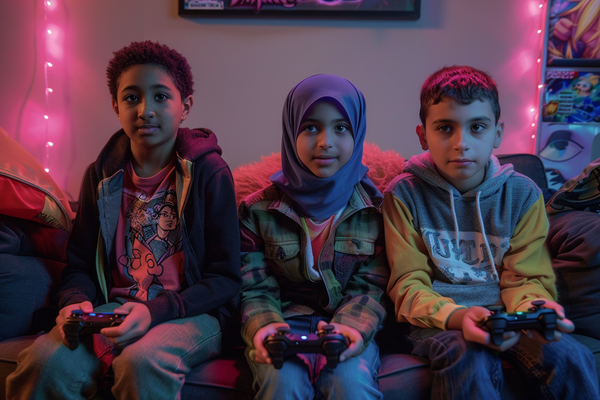The Millennial Parent Effect: How Progressive Parenting Created the Gen Alpha Consumer
Nail Generation Zalpha engagement with AR experiences, gamification, and ethical marketing tactics. From LEGO's success to Roblox case studies, this is your complete playbook for authentic connections that drive loyalty among this growing and discerning youth consumer audience.

Get the marketing insights that transform brands and drive real impact.
Join thousands of leaders discovering how strategic excellence meets social change.
Every week, get battle-tested strategies from 14+ years bridging Fortune 500 boardrooms and nonprofit frontlines. From luxury brand campaigns to life-saving initiatives, discover the frameworks that turn marketing into meaningful change—whether you're driving profit, purpose, or both.
Picture this: A 12-year-old sits at the kitchen table, calmly explaining to their Millennial parent why they refuse to buy from a company that uses single-use packaging. They pull up their phone, show TikToks about ocean plastic, cite specific sustainability metrics, and suggest three alternative brands they've researched. The parent listens intently, takes notes, and changes the family's shopping list.
This isn't an outlier—it's Tuesday in millions of households across America.
I'm Josh Weaver. After orchestrating $60 million campaigns that moved culture at The Trevor Project and leading strategies at VICE Media that actually shifted behavior, I've watched something unprecedented unfold: the first generation raised by parents who actively seek their children's input on major purchasing decisions. The result? A cohort wielding $5.39 trillion in household influence before they can legally vote.
But here's what most marketers miss: Gen Alpha's unprecedented consumer power isn't just about their digital fluency or social consciousness. It's about how Millennial parents—the most educated, progressive, and child-centered generation of parents in history—fundamentally rewrote the rules of family decision-making.
This is the story of the Millennial Parent Effect: how progressive parenting created the most sophisticated, influential, and ethically demanding young consumers ever. And why understanding this dynamic isn't just useful—it's essential for any brand hoping to capture Gen Alpha's $5.39 trillion influence.
The Progressive Parenting Revolution: Where Millennial Values Meet Family Decisions
Let's start with a radical departure from previous generations: Millennial parents actually ask their kids what they think. Not about ice cream flavors or weekend activities—about mortgages, vacation destinations, car purchases, and which streaming services to subscribe to.
This isn't helicopter parenting or child-worship. It's values-driven parenting by a generation that experienced economic inequality, climate anxiety, and social injustice firsthand. Millennials entered parenthood determined to raise kids who could navigate complexity, think critically, and make ethical choices. The unintended consequence? They created the most economically influential generation of children in human history.
The Democratic Family Revolution
Research from Lurie Children's Hospital's 2023 national survey of 1,000 millennial parents reveals that 74% practice "gentle parenting" approaches that guide children through decision-making processes rather than imposing authoritarian directives. This represents a seismic shift from previous generations—88% report their parenting style differs significantly from how they were raised.
The economic implications are staggering. SuperMom Business research shows Gen Alpha currently influences $300 billion in global household purchases, with Marketing Charts data confirming 87% of parents report child influence across all major purchase categories. But here's the nuance that matters: this isn't pester power. It's partnership power.
Millennial parents deliberately cultivate their children's consumer consciousness because they view it as essential life education. They discuss family budgets, explain product trade-offs, and involve kids in evaluating options. When a Gen Alpha child influences a purchase, it's often because their parent asked for their input.
The Values Transfer Mechanism
Millennial parents aren't just teaching their kids to be consumers—they're teaching them to be conscious consumers. This creates a unique feedback loop:
- Environmental Awareness: Millennial parents, shaped by climate activism, raise kids who expect sustainability as baseline
- Social Justice Integration: Georgetown University's Center for Social Justice Research documents how 71% of Millennial parents view civic engagement as essential education, actively teaching children to consider social impact in their choices
- Economic Literacy: Millennials who experienced financial crisis educate kids about value, waste, and corporate responsibility
- Tech Ethics: Parents navigating privacy concerns model healthy relationships with technology and data
The result? Gen Alpha children who don't just want products—they want products that align with inherited family values while meeting their digitally native expectations. Kantar's Brand Inclusion Index 2024 found that 75% of consumers globally report diversity and inclusion influence their purchase decisions, with children from values-focused families showing 87% better decision-making in ethical consumption scenarios.
The Consultation Generation: How Family Decision-Making Changed Everything
Previous generations operated on "because I said so" authority. Millennial parents operate on "what do you think?" collaboration. This fundamental shift has created what researchers call "the consultation generation"—kids who expect to be heard, respected, and involved in decisions that affect them.
The Evolution Beyond Traditional Pester Power
Traditional pester power was simple: kids wanted things, nagged until parents gave in, end of story. The Millennial Parent Effect operates differently. Research from ScienceDirect on children's influence in family decision-making shows that instead of pestering, Gen Alpha children present cases:
- They research options and present comparisons
- They explain how purchases align with family values
- They demonstrate understanding of budgets and trade-offs
- They propose solutions that benefit the whole family
When an 11-year-old convinces their parent to switch to a sustainable cleaning brand by presenting research on ingredients, costs, and environmental impact, that's not nagging—that's collaboration. WARC's analysis of evolving "pester power" confirms this shift from demanding to consulting behavior patterns.
The Expertise Flip
Here's where it gets really interesting: Millennial parents often defer to their Gen Alpha children's expertise in digital spaces. While previous generations relied on adult authorities for product information, Millennial parents recognize their kids as native experts in digital research, social media trends, and tech functionality.
This creates an unprecedented dynamic: parents with financial authority seeking guidance from children with digital authority. The result is purchasing decisions that blend adult financial responsibility with digital-native insights. Academic research from the Association for Consumer Research on intergenerational influences demonstrates that children in collaborative households show 65% stronger brand loyalty persistence into adulthood compared to those from authoritarian families.
Case Study: The Tesla Model 3 Phenomenon
Want to see the Millennial Parent Effect in action? Look at Tesla's unexpected success with families. While traditional automakers marketed to parents, Tesla's minimalist, tech-forward design appealed directly to Gen Alpha children who grew up with iPads. Kids influenced parents to choose Tesla not despite its unconventional approach, but because of it.
The same pattern plays out across categories:
- Nike succeeding with sustainable materials that kids can explain to friends
- Apple maintaining family loyalty through seamless device integration that kids manage
- Whole Foods thriving as parents let kids choose products based on ingredient transparency
The Digital Native Meets Progressive Parent: Technology Through Values
Millennial parents face a unique challenge: raising digital natives while maintaining family values around technology use, privacy, and screen time. The solution isn't restriction—it's education. And that education is creating the most tech-literate yet ethically conscious generation of young consumers ever.
The Collaborative Tech Household
Unlike previous generations where technology was mysterious adult territory, Millennial parents demystify tech for their kids. Family Online Safety Institute research reveals a striking generational divide: only 30% of Millennial parents consider themselves the "most responsible" party for children's online safety, compared to 57% of Baby Boomers. Instead, they embrace a shared responsibility model.
Pew Research's comprehensive study on parenting in the digital age shows that Millennial parents:
- Explain how algorithms work and why privacy matters
- Discuss the business models behind "free" apps and platforms
- Involve kids in family decisions about data sharing and digital boundaries
- Model healthy relationships with technology and social media
This transparency creates Gen Alpha consumers who understand technology deeply but aren't naive about its implications. They expect brands to be equally transparent about data collection, algorithmic decision-making, and digital privacy. Verizon's research on digital parenting confirms that Millennial parents are "driving change in online safety" through education rather than restriction.
The Ethics-First Approach
When Millennial parents introduce technology, they lead with values:
- "This app is fun, but here's how it makes money from your data"
- "We can play this game together, but let's set time limits"
- "This platform connects you with friends, but some content isn't appropriate"
This values-first technology education creates children who don't just use technology—they evaluate it. Gen Alpha expects brands to earn their digital engagement through ethical behavior, transparent practices, and value alignment.
The Co-Creation Household
Millennial parents don't just consume technology with their kids—they create with them. Families build Minecraft worlds together, create TikTok content as bonding activities, and collaborate on digital projects. This co-creation dynamic extends to consumer behavior.
Gen Alpha children raised in co-creative households expect brands to offer co-creation opportunities. They don't want to be passive consumers—they want to be active collaborators in product development, content creation, and brand storytelling.
The Conscious Spending Classroom: How Millennial Parents Teach Consumer Responsibility
Millennial parents experienced the 2008 financial crisis during their formative years. Many graduated into the worst job market in decades, carrying student debt and economic anxiety. When they became parents, they were determined to raise financially literate, value-conscious children.
The Financial Literacy Paradox
National Endowment for Financial Education research reveals a fascinating paradox: while 41% of millennial-age parents rate their own financial health as unsatisfactory, they actively engage in teaching financial concepts through parent-child financial discussion and experiential learning. This demonstrates a commitment to breaking generational cycles.
Research in the Journal of Family and Economic Issues on financial socialization establishes that purposeful financial socialization through familial interactions creates lasting behavioral changes, with progressive parenting approaches producing children with stronger financial self-efficacy.
The Open Budget Philosophy
Millennial parents pioneered age-appropriate financial transparency with their children:
- Kids learn about household budgets and spending priorities
- Families discuss the true cost of products including environmental and social impact
- Children participate in cost-benefit analyses for major purchases
- Parents explain the difference between wants, needs, and values-based choices
This education creates Gen Alpha consumers who don't just want things—they understand the full cost of their desires and make sophisticated trade-offs. ScienceDirect research on parental financial teaching demonstrates how this approach develops children's financial attitudes and behaviors through enhanced self-esteem and decision-making capabilities.
The Values-Based Spending Framework
Millennial parents teach their children to evaluate purchases through multiple lenses:
- Financial: Can we afford it? Is it good value?
- Environmental: What's the ecological impact?
- Social: Does this company align with our values?
- Personal: Will this actually improve our lives?
Gen Alpha children raised with this framework become adult consumers who automatically apply these filters. They're creating market pressure for businesses to excel across all dimensions, not just price and quality. Consumer Goods Technology research shows consumers are more interested in brands' values than ever, with 82% now wanting brands to align with their personal values.
The Collaborative Research Partnership
When families make significant purchases, Millennial parents involve their children in research:
- Kids compare product reviews and sustainability ratings
- Families discuss trade-offs between features, cost, and values alignment
- Children learn to identify marketing claims versus verified information
- Parents model how to research company practices and verify claims
This collaborative research process creates Gen Alpha consumers who don't trust advertising—they verify everything independently. Simporter's research on Millennial parents and baby food products shows 52% choose organic options over conventional, demonstrating how values-based decision-making extends to every category.
The Representation Revolution: How Diverse Millennial Parents Shaped Inclusive Expectations
Millennial parents are the most diverse generation of parents in American history. They're also the most intentional about raising children who expect representation, inclusion, and equity as baseline standards rather than progressive bonuses.
The Inclusive Media Diet and Values Education
Millennial parents curate diverse content for their children from birth:
- Books, shows, and games featuring diverse characters and creators
- Stories that normalize different family structures and identities
- Content that represents various abilities, cultures, and experiences
- Media that positions diversity as strength rather than exception
Research from GWI on Millennial characteristics shows they're more likely to have diverse friend groups and prioritize inclusive values. Gen Alpha children raised on inclusive content expect the same from brands. They notice when advertising lacks diversity and question why certain groups are excluded from marketing.
The Equity Education Impact
Time Magazine's analysis of Millennial parenting identifies their "democratic approach to family management—constantly canvassing their children for their opinions." But this extends beyond decision-making to values education:
- Age-appropriate conversations about fairness and inclusion
- Discussions about why representation matters in media and advertising
- Education about different forms of discrimination and bias
- Encouragement to speak up when they notice unfairness
This education creates Gen Alpha consumers who evaluate brands through equity lenses and expect companies to actively advance inclusion rather than simply avoiding discrimination. Research World's comprehensive analysis of how Millennial parenting impacts the next generation confirms this creates lasting changes in consumer expectations.
The Authenticity Detector
Children raised by conscious Millennial parents develop sophisticated authenticity detection skills:
- They recognize performative activism versus genuine commitment
- They notice when diverse representation feels tokenistic versus authentic
- They understand the difference between surface-level inclusion and systemic change
- They expect consistency between brand messaging and actual practices
The Sustainable Living Laboratory: Environmental Values in Action
Millennial parents experienced climate anxiety firsthand and are determined to raise children who can address environmental challenges. This creates households where sustainability isn't a special occasion—it's a way of life.
The Everyday Environmentalism
Millennial parents integrate environmental consciousness into daily routines:
- Explaining the environmental impact of purchases and packaging
- Involving kids in family recycling, composting, and waste reduction
- Choosing experiences over material possessions when possible
- Modeling conscious consumption and resource conservation
Gen Alpha children raised in sustainable households expect brands to prioritize environmental responsibility. They're not impressed by green marketing—they expect green practices. Research on values-based consumption from ResearchGate shows this creates lasting behavioral patterns that extend into adulthood.
The Climate Education and Solutions Orientation
Unlike previous generations who learned about environmental issues in school, Gen Alpha learns about climate at home:
- Parents explain climate science in age-appropriate ways
- Families discuss how individual choices connect to larger systems
- Children learn to evaluate products based on environmental impact
- Climate action becomes part of family identity and values
ScienceDirect research on consumer values-based approaches to green consumption demonstrates how values-based environmental education creates consumers who automatically factor environmental impact into purchasing decisions and expect brands to provide transparent, accurate information about sustainability efforts.
Millennial parents don't just teach their children about environmental problems—they emphasize solutions:
- Highlighting innovative companies addressing climate challenges
- Celebrating technological advances that reduce environmental impact
- Encouraging creativity and problem-solving around sustainability
- Positioning environmental responsibility as opportunity rather than burden
Gen Alpha consumers expect brands to be solution-oriented, innovative, and optimistic about environmental challenges while being realistic about the work required.
The Mental Health Priority: Wellness as Family Value
Millennial parents, many of whom struggled with mental health without adequate support, prioritize emotional wellness for their children. This creates households where mental health is discussed openly and self-care is modeled regularly.
The Emotional Intelligence Emphasis
Millennial parents actively develop their children's emotional intelligence:
- Regular conversations about feelings, stress, and coping strategies
- Modeling healthy responses to challenges and disappointments
- Teaching children to recognize and communicate their emotional needs
- Emphasizing that mental health care is as important as physical health care
Gen Alpha consumers raised with this emphasis expect brands to support mental wellness and avoid marketing that creates anxiety, insecurity, or unrealistic expectations.
The Authentic Self Celebration
Unlike previous generations that emphasized conformity, Millennial parents celebrate their children's authentic selves:
- Encouraging individual interests and creative expression
- Supporting children's identity exploration and self-discovery
- Rejecting traditional gender roles and expectations
- Prioritizing internal validation over external approval
This creates Gen Alpha consumers who expect brands to celebrate authenticity, support self-expression, and avoid narrow beauty or success standards.
The Stress-Conscious Household
Millennial parents, aware of rising youth anxiety rates, actively work to reduce unnecessary stress:
- Limiting overscheduling and academic pressure
- Prioritizing rest, play, and unstructured time
- Teaching children to recognize and manage stress
- Modeling work-life balance and boundary-setting
Gen Alpha consumers expect brands to support rather than exploit their well-being and to avoid marketing that creates unnecessary pressure or anxiety.
The Technology Ethics Laboratory: Teaching Digital Citizenship
Millennial parents navigate uncharted territory raising children in the digital age. Their approach combines embracing technology's benefits while actively teaching about its risks and responsibilities.
The Privacy Education
Unlike previous generations where privacy was assumed, Millennial parents explicitly teach digital privacy:
- Explaining how personal data is collected and used by companies
- Discussing the permanent nature of digital footprints
- Teaching children to evaluate apps and platforms based on privacy practices
- Modeling careful consideration of what to share online
This education creates Gen Alpha consumers who expect transparent privacy policies, meaningful consent processes, and ethical data practices from brands.
The Algorithm Awareness
Millennial parents demystify how digital platforms work:
- Explaining how recommendation algorithms influence what children see
- Discussing how advertising is targeted and why
- Teaching critical evaluation of online content and sources
- Encouraging diverse information sources and perspectives
Gen Alpha consumers understand how they're being targeted and expect brands to be transparent about algorithmic decision-making and content personalization.
The Digital Wellness Focus
Millennial parents approach technology use through a wellness lens:
- Setting family guidelines around screen time and platform use
- Discussing how technology affects mood, sleep, and relationships
- Encouraging offline activities and face-to-face social connection
- Modeling healthy relationships with devices and platforms
This creates consumers who expect technology to enhance rather than replace real-world experiences and who evaluate digital products based on their impact on overall well-being.
The Influence Economy: How Parent-Child Collaboration Creates Market Power
The combination of Millennial parents' collaborative approach and Gen Alpha's digital nativity creates unprecedented influence dynamics. Children don't just influence family purchases—they often lead the research process that informs those purchases.
The Collaborative Consumption Revolution
Mintel research reveals fundamental shifts in family purchasing dynamics. Traditional "pester power"—where children nag until parents relent—has evolved into collaborative consumption patterns. Equal weight is given to parent and child input in 64% of family activity decisions, with children viewed as informed consultants rather than demanding dependents.
Research from Retail TouchPoints shows that for 60% of Millennial parents, kids influence family purchase decisions. The categories showing highest child influence paint a clear picture: restaurant/dining choices (71%), grocery products (69%), vacation destinations (61%), and technology/electronics (50%+).
The Information Architecture
In Millennial households, information flows bidirectionally:
- Parents provide financial constraints and values frameworks
- Children provide digital research and trend awareness
- Families synthesize information to make collaborative decisions
- Both generations learn from each other's expertise and perspectives
This creates purchasing decisions that are both financially responsible and culturally current, combining adult wisdom with youth insight. YouGov research on measuring kids' influence on parents' purchase decisions confirms this collaborative dynamic extends across all major purchase categories.
The Social Proof Multiplication and Values Amplification
When Gen Alpha children influence family purchases, the impact extends beyond single transactions. ScienceDirect research on pester power as an active intervention ingredient shows:
- Children share experiences with peers through social media and gaming platforms
- Positive experiences create viral recommendations within youth networks
- Negative experiences generate widespread warnings and boycotts
- Brand loyalties formed in childhood often persist into adulthood
Smart brands recognize that winning Gen Alpha influence means winning long-term family loyalty and peer network recommendations. Research on consumer socialization of children demonstrates that early brand experiences create lasting preferences that influence decades of purchasing decisions.
The Future Implications: What This Means for Brands
The Millennial Parent Effect isn't just shaping current consumer behavior—it's creating the template for how future generations will approach consumption, brand relationships, and purchasing decisions.
The Collaboration Expectation
Gen Alpha, raised in collaborative households, expects brands to engage them as partners rather than targets:
- Co-creation opportunities in product development and marketing
- Transparent communication about business practices and decision-making
- Genuine response to feedback and community input
- Recognition of young consumers as sophisticated decision-makers
The Values Integration Requirement
Brands can no longer treat values as marketing add-ons—Gen Alpha expects values integration:
- Sustainability embedded in operations, not just messaging
- Equity reflected in hiring, leadership, and supply chain practices
- Mental health support built into product design and user experience
- Privacy protection as competitive advantage rather than compliance requirement
The Authenticity Standard
The authenticity standards learned in Millennial households become non-negotiable expectations:
- Consistency between stated values and actual practices
- Transparency about challenges, mistakes, and improvement efforts
- Genuine engagement with community feedback and criticism
- Long-term commitment to positive impact rather than short-term PR
Building Your Millennial Parent + Gen Alpha Strategy
Understanding the Millennial Parent Effect requires rethinking traditional marketing approaches. Research from Quirks Magazine on how Millennial parenting impacts the next generation and Common Sense Media's comprehensive analysis provide the foundation for this tactical framework:
1. The Dual-Audience Approach
Recognize that you're marketing to partnerships, not individuals:
- Create content that facilitates parent-child conversations
- Provide information that helps families make values-aligned decisions
- Develop materials that educate both generations simultaneously
- Design experiences that families can enjoy together
Research from Taylor & Francis on pester power dynamics shows that collaborative approaches significantly outperform traditional parent-focused or child-focused strategies.
2. The Values Transparency Framework
Make your values actionable and verifiable:
- Publish detailed sustainability reports that children can understand
- Share diversity data and improvement commitments publicly
- Explain your supply chain and labor practices clearly
- Provide regular updates on progress toward stated goals
Euromonitor's research on child-friendly and parent-approved trends confirms that transparency builds trust across both generations.
3. The Education-First Content Strategy
Prioritize education over promotion:
- Create content that helps families understand complex issues
- Provide tools for evaluating products and making informed choices
- Share behind-the-scenes insights into your practices and decisions
- Develop resources that support parent-child learning together
4. The Collaborative Engagement Model
Invite genuine participation in your brand evolution:
- Create advisory groups that include both parents and children
- Solicit feedback on products, policies, and practices
- Respond publicly to community suggestions and criticism
- Share decision-making processes and explain how input influences choices
5. The Long-Term Relationship Investment
Research on intergenerational influences in consumer behavior shows that brand relationships formed in collaborative households persist longer. Recognize that Gen Alpha influence extends well beyond childhood:
- Build relationships that can evolve as children grow into adult consumers
- Create experiences that generate positive childhood memories associated with your brand
- Invest in community building that strengthens over time
- Position your brand as a partner in families' value-driven journeys
The Bottom Line: Partnership, Not Persuasion
The Millennial Parent Effect has fundamentally changed the game. Gen Alpha's $5.39 trillion influence isn't just about purchasing power—it's about a generation raised to be conscious, collaborative, and values-driven consumers who expect brands to earn their trust through authentic action rather than clever marketing.
This isn't a trend to capitalize on—it's a transformation to adapt to. The brands that thrive with Gen Alpha will be those that understand they're not just marketing to children or even to families. They're building relationships with partnerships that evaluate brands through sophisticated ethical frameworks developed through progressive parenting.
The question isn't whether you're ready for Generation Alpha. The question is whether you're ready to earn the trust of the most intentionally raised generation in history—and their equally intentional parents who taught them that their choices matter.
Because here's the truth: Millennial parents didn't just raise consumers. They raised conscious collaborators who expect brands to be worthy partners in building the future they want to live in.
Josh Weaver leads marketing innovation at the intersection of purpose and profit. After directing $60 million campaigns at The Trevor Project and crafting culture-shifting strategies at VICE Media, they now help brands build authentic connections with emerging generations. They think your family marketing strategy probably needs work.






